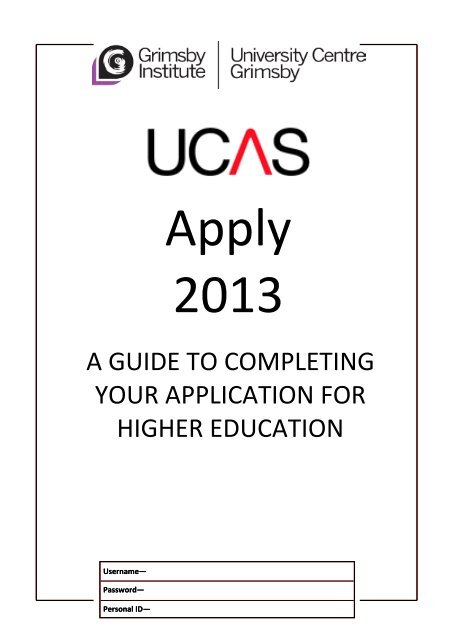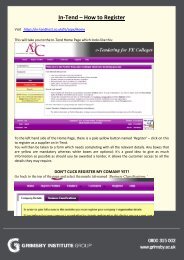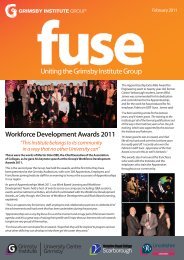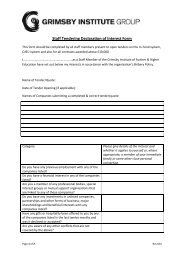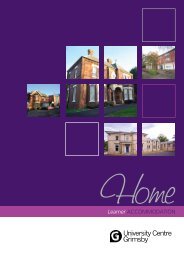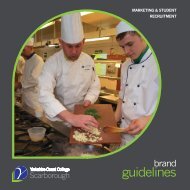UCAS student help booklet please click here - Grimsby Institute of ...
UCAS student help booklet please click here - Grimsby Institute of ...
UCAS student help booklet please click here - Grimsby Institute of ...
You also want an ePaper? Increase the reach of your titles
YUMPU automatically turns print PDFs into web optimized ePapers that Google loves.
Apply<br />
2010 2013<br />
A GUIDE TO COMPLETTING<br />
COMPLETING<br />
YOUR APPLICATION FOR<br />
HIGHER EDUCATION<br />
Username—<br />
Password—<br />
Personal ID—<br />
- 1 -
PAGE - 1 <strong>UCAS</strong> 2013 OVERVIEW<br />
CONTENTS<br />
PAGE - 2 APPLICATION FLOWCHART<br />
PAGE - 3 HOW TO REGISTER<br />
You need to register to use Apply. This section will require certain personal details, such as<br />
your name, address and date <strong>of</strong> birth. The registration process generates your username<br />
and you create your own password, which you use to log in to Apply.<br />
PAGE - 4 COMPLETING YOUR APPLICATION<br />
Navigating the application form and <strong>help</strong> available<br />
PAGE - 6 PERSONAL DETAILS<br />
Some <strong>of</strong> this section will be filled in automatically with the details you entered during<br />
registration; you should check that the information is correct. It will also ask for further<br />
information that universities and colleges require, such as your nationality, residential status<br />
and an outline <strong>of</strong> any disabilities you may have.<br />
PAGE - 7 ADDITIONAL INFORMATION<br />
If you live in the United Kingdom you will need to provide additional details about any nonexamination-based<br />
activities you have undertaken in preparation for higher education,<br />
together with other information designed to <strong>help</strong> us and the universities and colleges to<br />
monitor applications and in terms <strong>of</strong> equal opportunities, such as your national identity and<br />
ethnic origin.<br />
PAGE - 8 STUDENT FINANCE (UK applicants only)<br />
If you live in England, Wales or Northern Ireland and will be applying for <strong>student</strong> finance to<br />
<strong>help</strong> with tuition fees for your course and living costs, you can make the process easier by<br />
allowing <strong>UCAS</strong> to share some <strong>of</strong> your application details with <strong>student</strong> finance. <strong>UCAS</strong> will<br />
also provide information and links to further advice for applicants who live in Scotland.<br />
PAGE - 9 CHOICES<br />
In this section you enter the courses and universities and colleges to which you are<br />
applying. You can enter your choices in any order because t<strong>here</strong> is no preference order -<br />
Apply will store your choices in alphabetical order. For each choice, <strong>UCAS</strong> ask you to<br />
indicate whether you will be living at home or in <strong>student</strong> accommodation, and if you are
applying for deferred entry, for example starting the course in 2013. It is important that you<br />
check the information carefully before marking the section as complete.<br />
PAGE - 10 EDUCATION<br />
Universities / colleges need to know w<strong>here</strong> you have studied and which qualifications you<br />
are taking/have taken. First you need to enter your schools' and colleges' details and then<br />
list your qualifications. Please make sure that you have included all relevant qualifications,<br />
including all those that you have completed and any that you are currently studying. The<br />
universities and colleges may make you an <strong>of</strong>fer based upon the information you give so it<br />
is vital that it is correct.<br />
PAGE - 11 EMPLOYMENT<br />
In this section, you fill in the details <strong>of</strong> your work history and employers. If you have not had<br />
any jobs, you can leave this section blank, but you will still need to mark it as complete in<br />
order to continue with your application.<br />
PAGE - 12 PERSONAL STATEMENT<br />
We ask you to complete a personal statement, which tells your universities and colleges<br />
why you are applying for the course(s) you have chosen and why they should want you as<br />
a <strong>student</strong>. This statement <strong>help</strong>s universities and colleges to know more about you as a<br />
person.<br />
PAGE - 15 REFERENCE<br />
Your application requires a reference from a tutor, careers adviser or other pr<strong>of</strong>essional<br />
who knows you well enough to write about you and your suitability for the course. If you are<br />
applying through a school or college, this section will be completed by your referee. If you<br />
are applying independently you will need the name, telephone number and email address<br />
<strong>of</strong> your referee.<br />
You will need to mark each <strong>of</strong> these sections as<br />
complete before your application can be sent
<strong>UCAS</strong> 2013 OVERVIEW<br />
<strong>UCAS</strong> (Universities & Colleges Admissions Service) Apply is an application<br />
system that allows you to apply online for full-time undergraduate courses at<br />
universities and colleges in the UK. This <strong>booklet</strong> will guide you through the<br />
registration process, completing your application and sending it to <strong>UCAS</strong>.<br />
T<strong>here</strong> is a fee for making an application. The amount depends upon how<br />
many courses, universities and colleges you apply to.<br />
How much will it cost? If you apply for more than one course, university<br />
or college, the cost is £23. If you only apply for one course at one university or<br />
college, you pay £12. You will receive a welcome letter which will explain how<br />
you can add more choices later (if you have paid only £12 and choose to add<br />
further choices, you will need to pay a further £11). The cost for applications<br />
received after 30 June 2013 is £23 because these applications will be entered<br />
into Clearing. The application fee includes VAT.<br />
How do I pay? You will need to make your payment via the internet using a<br />
credit or debit card. The card need not be in your own name, but you will<br />
require the consent <strong>of</strong> the cardholder. If you pay your fee using a credit or<br />
debit card that you do not have permission to use, <strong>UCAS</strong> will cancel your<br />
application.<br />
UK and international Visa, Visa Debit, Delta, MasterCard, JCB, Maestro, and<br />
Electron credit or debit cards are accepted methods <strong>of</strong> payment. If you have<br />
trouble paying for your application, <strong>please</strong> contact the Customer Service Unit<br />
on Tel: +44 (0)871 468 0 468 for information on alternative payment methods.<br />
When do I need to make my payment? You pay after you have<br />
completed your application and are in the process <strong>of</strong> sending it to us (or to<br />
your referee). Click on ‘PAY AND SEND’ you will be asked for your card<br />
details once you have agreed to the terms <strong>of</strong> the Declaration and Data<br />
Protection statement. The system will automatically know whether you should<br />
pay the full £23 or the single choice fee <strong>of</strong> £12. Your application will then be<br />
sent to <strong>UCAS</strong> or, if you are applying through a school or college to your<br />
referee. Once <strong>UCAS</strong> receive your application, either from you or your referee,<br />
it will be processed and a copy sent to each <strong>of</strong> your chosen universities and<br />
colleges, you will also receive a welcome letter.<br />
Please remember that you can only complete one application in each cycle. If<br />
you send a second application, it will be cancelled and you will not receive a<br />
refund.
APPLICATION FLOWCHART<br />
Insert pdf
HOW TO REGISTER<br />
When you register, you provide certain personal details, including first names, surname,<br />
title, gender, date <strong>of</strong> birth, address, telephone numbers and email address. These will<br />
transfer to your application and you will not be asked to enter them again. If any <strong>of</strong> these<br />
details change whilst you are completing your application, you will be able to amend them.<br />
Follow the simple steps outlined below<br />
1. Go to www.ucas.com<br />
2. Click on ‘register/log in to Apply 2013’<br />
3. Follow the online instructions to register and enter your personal details<br />
4. Choose a password, select four security questions and enter relevant answers<br />
5. Answer the question “HOW ARE YOU APPLYING” see below before answering<br />
APPLYING AS AN INDIVIDUAL<br />
Select this option if you are not currently attending a school, college or centre.<br />
You will need to answer a few questions to confirm your eligibility before you can start<br />
your application. To complete your application, you will also need to supply a reference<br />
from someone who knows you well enough to write about you and your suitability for<br />
higher education. We will not accept references from family, other relatives or friends.<br />
APPLYING THROUGH A SCHOOL, COLLEGE OR CENTRE<br />
Select this option if are a currently attending a school, college or centre.<br />
You will need to obtain a 'buzzword' from the centre you are applying through. This<br />
buzzword links your application to your centre so that your referee can write and attach<br />
their reference. Once you have completed your application, you can send it to your<br />
referee. Your referee will then add the reference, check and approve your application and<br />
send the completed application to <strong>UCAS</strong><br />
<strong>Grimsby</strong> <strong>Institute</strong> <strong>of</strong> Further & Higher Education<br />
BUZZWORD = GRIMSBY13<br />
NOTE: only applicable to <strong>student</strong>s already attending the GIFHE<br />
6. Click next to complete the first part <strong>of</strong> your registration and to create a username<br />
7. Make a note <strong>of</strong> your username and password, you will need them to start<br />
your application and every time you log in.<br />
If you have recently left full-time education, you should contact your school or<br />
college before making an application as you may be able to apply through them, especially<br />
if you will be asking them to provide your reference.
COMPLETING YOUR APPLICATION<br />
You will need to log in using your username and password. Now complete all the sections<br />
listed to the left <strong>of</strong> this screen. (See below)<br />
SECTIONS TO COMPLETE<br />
HELP CHANGES FOR EACH SECTION<br />
Each <strong>of</strong> the sections has a<br />
‘section complete’ tick box<br />
at the bottom - tick this<br />
when you are happy that all<br />
answers are correct and<br />
complete
T<strong>here</strong> are two types <strong>of</strong> <strong>help</strong> available in Apply. Help that<br />
gives you an overview about the current page that you<br />
are viewing, and <strong>help</strong> that is specific to any field that<br />
requires you to enter details or select an option onscreen<br />
(<strong>click</strong> on the question mark next to each field).<br />
Please make sure that<br />
you read the <strong>help</strong> text<br />
before completing each<br />
section <strong>of</strong> your<br />
application ! !<br />
Your application does not have to be completed all at once, and the system allows you to<br />
leave a section partially completed. Until you complete the payment process, you can return<br />
to any section and change the information that you have entered.<br />
Each section listed on the left will need to be marked as complete before you can send your<br />
application to <strong>UCAS</strong> (or to your referee if you are applying through a school, college or<br />
other organisation). To do this, <strong>please</strong> tick the 'section completed' box at the bottom <strong>of</strong> each<br />
page and <strong>click</strong> 'save'. A red tick will then appear next to each completed section.<br />
Applications can be sent from mid-September.<br />
The Pay/Send link will be available once your application is complete.<br />
If the Pay/Send link is not available, <strong>please</strong> check the following:<br />
1. Each section <strong>of</strong> your application has been marked as complete (a red tick will be<br />
displayed next to each section);<br />
2. If you have entered an email address, it has been verified;<br />
3. The date is after mid-September.<br />
Please do not continue with this application if you have already<br />
submitted an application for the 2013 entry cycle. This includes deferred<br />
entries that you are currently holding from previous cycles. All duplicate<br />
applications will be cancelled without refund.
PERSONAL DETAILS<br />
Your title, gender, name and address and date <strong>of</strong> birth will be filled in automatically with the<br />
details provided during registration.<br />
Further details about your personal circumstances are required<br />
You are asked for extra information so that the universities and colleges can decide what<br />
tuition fees you should be charged and what entitlements or special requirements you might<br />
be eligible to receive. <strong>UCAS</strong> need to know your residential status, w<strong>here</strong>/whether you will<br />
be looking for funding and/or sponsorship, and if you have any special needs or disabilities<br />
which they would need to address.<br />
As part <strong>of</strong> the duty <strong>of</strong> care to all applicants/existing <strong>student</strong>s <strong>UCAS</strong> will need to declare if<br />
you have any relevant criminal convictions. You are asked to tick a box if you have a<br />
relevant criminal conviction. If you do not, <strong>please</strong> leave the box blank.<br />
Entering and verifying an email address<br />
If you enter an email address, you will be asked to verify that it is correct. You will receive<br />
an email containing instructions on what to do. Your email address needs to be verified<br />
before you can send your application to <strong>UCAS</strong>.<br />
<strong>UCAS</strong> need your email address so that once your application is processed, emails can be<br />
sent alerting you to changes to the status <strong>of</strong> your application, including decisions made by<br />
your chosen colleges or universities.<br />
Your email address will be seen by <strong>UCAS</strong> and the universities and colleges, so <strong>please</strong><br />
make sure that it does not cause <strong>of</strong>fence.<br />
Nominated access<br />
If you are likely to be away at any time during the application period, for example on a gap<br />
year, you may wish to appoint someone to act for you who can make decisions on your<br />
behalf in your absence and with whom we can discuss your application if necessary.<br />
On your application, enter the name <strong>of</strong> the person you appoint and their relationship to you.<br />
Parents, other relatives and guardians would be obvious choices.<br />
This section <strong>of</strong> your application is not compulsory - you do not have to provide<br />
details if you do not wish to nominate anyone.<br />
Please remember that universities and colleges have their own policies for discussing<br />
applications with third parties.
ADDITIONAL INFORMATION<br />
Further information required by the universities and colleges<br />
This section is available to applicants who are permanently resident in the UK. You are<br />
asked to enter the following details.<br />
o Ethnic origin and national identity - you also have the option to select a dual<br />
national identity<br />
o Activities in preparation for higher education - you can enter details <strong>of</strong> up to two<br />
activities such as summer schools or taster courses. If you have been involved in<br />
more than two then enter the most recent. These take place at all times <strong>of</strong> the year,<br />
and may go under another name, such as summer schools, Saturday University,<br />
campus days, summer academies, taster courses and booster courses. If you have<br />
not taken any such course, <strong>please</strong> leave the related sections blank. These activities<br />
do not include attendance at open days.<br />
o Care, parental education and occupational background - choose your response<br />
from the drop-down lists except in the case <strong>of</strong> occupational background, which allows<br />
you to enter 22 characters <strong>of</strong> free text. These questions are not compulsory.<br />
Universities and colleges may have different policies as to if, when and/or how the<br />
information may be used. For example, it could be for statistical monitoring purposes<br />
after decisions have been made, or it could be used at the application stage. If you<br />
have any concerns as to how a university or college may use this data, if indeed they<br />
do use it, <strong>please</strong> see the university or college website or contact the institution for<br />
further details.<br />
You can also select to receive written communications in Welsh from <strong>UCAS</strong> and Welsh<br />
universities and colleges from this screen.<br />
Your national identity reflects how you choose to classify yourself. It is different to ethnicity<br />
and nationality and can be based on many things, such as culture, language or<br />
ancestry/family history. If you would rather not provide this information, you can select 'I<br />
prefer not to say' from the list <strong>of</strong> options.<br />
Your answer will <strong>help</strong> to inform research on the provision and take-up <strong>of</strong> higher education<br />
across the population. Your ethnic origin and national identity will not be released to your<br />
chosen universities or colleges until after a decision has been made regarding your<br />
application.
STUDENT FINANCE<br />
This section is only available to applicants who are permanently resident in the UK.<br />
If you will be applying for <strong>student</strong> finance to <strong>help</strong> with tuition fees for your course and living<br />
costs, you can make the process easier by allowing <strong>UCAS</strong> to share some <strong>of</strong> your<br />
application details with your <strong>student</strong> finance company. This makes applying for <strong>student</strong><br />
finance much quicker.<br />
You can request that <strong>UCAS</strong> remind you by electronic means when the application process<br />
for <strong>student</strong> finance opens. You will need to log into your <strong>UCAS</strong> application and opt into<br />
share your details with the <strong>student</strong> finance company. Your application for <strong>student</strong> finance<br />
will then be pre-populated with information from your <strong>UCAS</strong> application, such as personal<br />
details and course choice. This will make applying for <strong>student</strong> loans and grants much<br />
quicker.<br />
You can opt out <strong>of</strong> this process at any time once we have processed your <strong>UCAS</strong><br />
application.
CHOICES<br />
You can choose up to five courses, which Apply will arrange into alphabetical order. Each<br />
university and college will only see details <strong>of</strong> their course or courses for which you have<br />
applied. They will not see other choices until you have received your final decision.<br />
The combination <strong>of</strong> choices allowed depends upon your chosen course(s)<br />
You can apply to a maximum <strong>of</strong>:<br />
• Four courses in any one <strong>of</strong> medicine/dentistry/veterinary medicine/veterinary science<br />
• One course at either the University <strong>of</strong> Oxford or the University <strong>of</strong> Cambridge (unless<br />
you already have a degree or will have gained a degree before September <strong>of</strong> this<br />
cycle in which case you can apply to both).<br />
You can use your remaining choice(s) for any other subject. For example, if you apply to<br />
four medicine courses, you could still make one choice for veterinary medicine. However,<br />
be aware that your personal statement will be sent to all universities and colleges you've<br />
chosen.<br />
Be prepared for additional requirements<br />
Some courses require an admissions test. It is your responsibility to find out whether your<br />
chosen course(s) need you to take one, and to register by the relevant deadline.<br />
If you are applying for medicine, dentistry, nursing, midwifery or certain other health<br />
courses, UK health authorities recommend you should be immunised against Hepatitis B<br />
before you start training. Universities and colleges may also ask you for certificates to show<br />
that you are not infected. If you are applying for one or more <strong>of</strong> these subjects, you should<br />
check the immunisation and certification requirements with the universities and colleges<br />
you have chosen.<br />
Some courses in fields such as social work will require that you undergo a check through<br />
the Criminal Records Bureau and/or become a member <strong>of</strong> the Independent Safeguarding<br />
Authority or its Scottish equivalent. Check with the universities and colleges you have<br />
chosen for their requirements and advice on how to fulfil them.<br />
For information on courses <strong>please</strong> check the ‘Course Search’ section <strong>of</strong> the <strong>UCAS</strong> website<br />
www.ucas.com
EDUCATION<br />
We need to know w<strong>here</strong> you have studied and which qualifications you are taking/have taken. You<br />
need to fill in details <strong>of</strong> your schools or colleges and then list your qualifications, one by one. You<br />
must include all schools, colleges and universities that you have attended since the age <strong>of</strong> 11, even<br />
if you withdrew from your course. T<strong>here</strong> is space to enter up to 10 centres. For each school and<br />
college, you must provide details <strong>of</strong> the following qualifications to <strong>help</strong> universities and colleges<br />
consider your application.<br />
• All qualifications for which you have accepted certification from an awarding body, even if you are<br />
retaking all or part <strong>of</strong> the qualification<br />
• All qualifications for which you are currently studying or for which you are awaiting results<br />
Mature <strong>student</strong>s – You are advised to enter details for all your qualifications. If you do not have<br />
any qualifications, you should still enter details for your schools. You will be asked whether you<br />
obtained any qualifications at each school or college and can then select 'no'. You should ignore the<br />
warning message and <strong>click</strong> on 'section completed' and 'save' to complete the education section.<br />
If you are hoping to enter higher education through the Accreditation <strong>of</strong> Prior Learning (APL) or the<br />
Accreditation <strong>of</strong> Prior Experiential Learning (APEL), you still apply through <strong>UCAS</strong>, but you should<br />
contact your chosen universities and colleges to discuss whether APL or APEL is acceptable and<br />
what evidence they will need.<br />
How to enter qualifications - Add details <strong>of</strong> all <strong>of</strong> the schools, colleges and universities that<br />
you've attended, then <strong>click</strong> on the 'add qualification' link below each one and enter the qualifications<br />
you've taken, or are currently taking, at that centre.<br />
If you're applying through a school or college, you might see a short list <strong>of</strong> qualifications that are<br />
relevant to you. Otherwise, you'll see that the qualifications are listed alphabetically on the A-Z list.<br />
If you can't find your qualification name in the list, try looking under the country w<strong>here</strong> you<br />
completed the qualification (for example, France - French Baccalaureate). If you still can't find it in<br />
the list, <strong>click</strong> 'O' in the A-Z list and select the relevant 'other' option.<br />
If you're resitting a qualification you need to enter it twice: once as a completed qualification with the<br />
grade achieved and once as a qualification with the result 'Pending'.<br />
Units/modules - You must enter units/modules for some qualifications, but for others it's optional,<br />
check if t<strong>here</strong>'s an asterisk next to, if t<strong>here</strong> is, you need to add these details. If they're optional,<br />
check the Entry Pr<strong>of</strong>iles in Course Search to see if universities want your units or module results<br />
and add them if they do<br />
International <strong>student</strong>s You should check the suitability <strong>of</strong> your qualifications with the<br />
admissions <strong>of</strong>fices at each <strong>of</strong> your chosen universities and colleges before applying. Each one will<br />
decide whether or not your qualifications meet or could meet their entry requirements for the<br />
course(s) you are interested in. When you apply, you should give full details <strong>of</strong> all your<br />
qualifications, including exams you took when you left school, exams you took to get into higher<br />
education, vocational exams and any other qualifications or awards. Please do not try to give a UK<br />
equivalent. If your first language is not English, you should say whether or not your qualifications<br />
were completely or partly assessed in English and enter details for any English language tests you<br />
have taken or plan to take.
EMPLOYMENT<br />
Tell your chosen universities and colleges about your paid employment<br />
experience<br />
This section is w<strong>here</strong> you give brief details <strong>of</strong> up to five employers, including company<br />
name and address, a description <strong>of</strong> your job, and start and finish dates. You will also be<br />
asked to say whether you worked full- or part-time. This includes weekend and holiday jobs.<br />
If your work experience has been unpaid, <strong>please</strong> include the details in your personal<br />
statement.<br />
If you find this section too small (for example, if you have had several jobs) and you feel<br />
more information would benefit your application, you should send full details direct to your<br />
chosen universities and colleges once your application has been processed by <strong>UCAS</strong>.<br />
Alternatively, you may wish to provide more details in your personal statement.<br />
If you have not had any paid work experience, you can leave this section blank, but you will<br />
need to mark it as complete.
YOUR PERSONAL STATEMENT<br />
The personal statement is your opportunity to tell universities and colleges about your<br />
suitability for the course(s) that you hope to study. You need to demonstrate your<br />
enthusiasm and commitment, and above all, ensure that you stand out from the crowd.<br />
This is a very important part <strong>of</strong> your application, w<strong>here</strong> you need to give some relevant<br />
background information about yourself, your interests, reasons for your choice <strong>of</strong> course<br />
and why they should want you as a <strong>student</strong>. You may want to include:<br />
• What career plans you have for when you complete your course<br />
• Any job, work experience or voluntary work you have done<br />
• Out <strong>of</strong> school activities – Duke <strong>of</strong> Edinburgh Award, Young Enterprise, Summer<br />
schools etc<br />
• If you’re planning to take a year out, your reasons why<br />
• Your social, sports and leisure interests<br />
• Key skills – IT, communication, numeracy, etc<br />
Consider using paragraphs and headings to <strong>help</strong> the admissions tutor and make sure you<br />
check for spelling mistakes.<br />
We recommend that you prepare your personal statement <strong>of</strong>fline as a word-processed<br />
document and then copy and paste it in, as the Apply system will time-out after 60 minutes<br />
<strong>of</strong> inactivity. You can also enter your personal statement online directly into Apply but<br />
remember to save it to prevent your work being lost.<br />
Does it matter?<br />
Some course tutors find personal statements crucial when making decisions, w<strong>here</strong>as<br />
others might not put as much emphasis on them. Since you do not know who will be looking<br />
at your statement, the safest thing is to do a good job. In many cases, applicants are not<br />
interviewed, so this may be your only chance to make the case for you to be <strong>of</strong>fered a<br />
place. Remember that the person reading your statement is an expert in your chosen area<br />
<strong>of</strong> interest so they will want to know the reasons why you have chosen the subject. As<br />
universities and colleges get thousands <strong>of</strong> applications each year, it’s sometimes difficult to<br />
make a selection just from the facts on an application form. This is your chance to really<br />
sell yourself, so take the time to prepare it well.<br />
Make sure that your personal statement is your own work<br />
<strong>UCAS</strong> will subject applications to similarity detection tests, designed to identify work copied<br />
from another source. Do not be tempted to copy another person's application materials, or<br />
download your personal statement <strong>of</strong>f the web. T<strong>here</strong> could be serious consequences to<br />
using other people's work. If <strong>UCAS</strong> have cause to question your application, <strong>UCAS</strong> will<br />
inform all the universities and colleges to which you have applied. They will then take the<br />
action they consider to be appropriate. <strong>UCAS</strong> will also contact you by email.
WHAT TO INCLUDE IN YOUR PERSONAL STATEMENT<br />
Interests, experiences and abilities that can be included in your statement<br />
Below are some suggestions <strong>of</strong> what to include in your personal statement. These are<br />
guidelines only so don't worry if some <strong>of</strong> the suggestions do not apply to you.<br />
• Why you have chosen the course(s) - this is particularly important when you're applying<br />
for a subject that you have not studied before<br />
• The reasons why that subject area interests you<br />
• Evidence that you understand what is required to study the course, e.g. if applying for<br />
psychology courses, show that you know how scientific the subject is<br />
• How your current or previous studies relate to the course(s) that you have chosen<br />
• Any activities that demonstrate your interest in the course(s)<br />
• Why you want to go to university or college<br />
• Details <strong>of</strong> jobs, placements, work experience or voluntary work, particularly if it's<br />
relevant to your chosen course(s)<br />
• Hobbies, interests and social activities that demonstrate your skills and abilities<br />
• Details <strong>of</strong> non-accredited skills and achievement which you have gained through<br />
activities such as:<br />
o ASDAN (Award Scheme Development and Accreditation Network) awards, for<br />
example, Universities Award<br />
o Diploma <strong>of</strong> Achievement<br />
o Duke <strong>of</strong> Edinburgh Award<br />
o Millennium Volunteers Scheme<br />
o v 50Hour Award<br />
o WorldWide Volunteering Certificate <strong>of</strong> Volunteering Achievement<br />
o Young Enterprise<br />
• Details <strong>of</strong> accreditation achieved for any activities in preparation for higher education,<br />
for example through the ASDAN Aimhigher Certificate <strong>of</strong> Personal Effectiveness (CoPE<br />
qualification)<br />
• Any other achievements that you are proud <strong>of</strong>, eg reaching grade three piano or being<br />
selected for the county cricket team<br />
• Positions <strong>of</strong> responsibility that you hold / have held both in and out <strong>of</strong> school, eg form<br />
prefect or representative for a local charity<br />
• Attributes that make you interesting, special or unique<br />
• Whether you have any future plans <strong>of</strong> how you want to use the knowledge and<br />
experience that you gain.<br />
If you are an international <strong>student</strong>, also give your answers to these questions:<br />
• Why do you want to study in the UK?<br />
• What evidence do you have to show that you can successfully complete a higher<br />
education course that is taught in English? Please say if some <strong>of</strong> your studies have<br />
been assessed in English.<br />
• Have you had a position <strong>of</strong> authority or used your communication skills in any activity?
Dos and don'ts when constructing your personal statement<br />
Do create a list <strong>of</strong> your ideas before attempting to write the real thing.<br />
Do expect to produce several drafts before being totally happy.<br />
Do ask people you trust for their feedback.<br />
Do check university and college prospectuses, websites and Entry Pr<strong>of</strong>iles, as<br />
they usually tell you the criteria and qualities that they want their <strong>student</strong>s to<br />
demonstrate.<br />
Do use your best English/Welsh and don't let spelling and grammatical errors<br />
spoil your statement.<br />
Do be enthusiastic - if you show your interest in the course, it may <strong>help</strong> you<br />
get a place.<br />
Don't feel that you need to use elaborate language. If you try too hard to<br />
impress with long words that you are not confident using, the focus <strong>of</strong> your<br />
writing may be lost.<br />
Don't say too much about things that are not relevant - if you think that you<br />
are starting to, take a break and come back to your statement when you feel<br />
more focused.<br />
Don't lie - if you exaggerate you may get caught out at interview when asked<br />
to elaborate on an interesting achievement.<br />
Don't rely on a spellchecker as it will not pick up everything - pro<strong>of</strong> read as<br />
many times as possible.<br />
Don't leave it to the last minute - your statement will seem rushed and<br />
important information could be left out.<br />
Don't expect to be able to write your personal statement whilst watching TV or<br />
surfing the internet - this is your future, so make the most <strong>of</strong> the opportunity to<br />
succeed.
YOUR REFERENCE<br />
Your referee should know you well enough to write about you and to comment on<br />
your suitability for higher education. References are usually written by someone who<br />
knows you academically. Most references will talk about you from a teacher's or tutor's<br />
perspective: how you work academically, how you interact with other <strong>student</strong>s and<br />
teachers, for example. Your reference does not have to be academic, but if you are<br />
studying or have recently left school or college, a reference from your school or college will<br />
be expected.<br />
If you are currently studying, or have recently left school or college, you<br />
should ask your headteacher, principal or an appropriate teacher or tutor to provide a<br />
reference.<br />
If you are a mature <strong>student</strong> and cannot obtain an academic reference, you<br />
should ask a responsible person who knows you to provide your reference. This could be<br />
an employer, training <strong>of</strong>ficer, careers adviser, a teacher on a recent relevant further<br />
education course, or a senior colleague in employment or voluntary work.<br />
You cannot send your application to <strong>UCAS</strong> without a reference unless you have agreement<br />
from your chosen universities and colleges that a reference is not required. We will not<br />
accept references from family, other relatives or friends.<br />
PROVIDING YOUR REFERENCE<br />
The way that your reference is entered into your application depends on whether you are<br />
applying as an individual or through a school, college or other organisation.<br />
Applications through a school, college or other organisation<br />
You will not have access to your reference. This will be completed on your behalf by your<br />
centre.<br />
1. You should check that each section <strong>of</strong> your application is correct and mark them all<br />
as complete<br />
2. You then pay for your application and send it online to your referee<br />
3. Your referee will check and approve your application<br />
4. Your referee will write the reference<br />
5. Your centre will approve the reference and send it to <strong>UCAS</strong><br />
6. Your application will then be processed<br />
Applications made as an individual<br />
You will need to contact your referee to make sure they are willing to give you a reference<br />
using the online method. Find out their telephone and email details so that they can be<br />
contacted to request your reference. Enter their contact details in the reference section and<br />
<strong>click</strong> 'Ask referee to complete reference'.<br />
An email will be sent to them with a link to the <strong>UCAS</strong> website and a password. Your referee<br />
can <strong>click</strong> on the <strong>help</strong> text links to read advice on what to include in the reference. <strong>UCAS</strong>
check that they are still able to supply your reference and ask them to confirm their identity.<br />
If they decline to give you a reference for any reason <strong>UCAS</strong> will notify you. <strong>UCAS</strong> notify you<br />
by email when the reference is complete and a red tick will be displayed next to the<br />
'Reference' section in the left-hand navigation section. You can then complete and submit<br />
your application.<br />
If no reference is needed<br />
You need to provide details for a referee and a reference unless you have contacted all<br />
your universities and colleges and they have all agreed that no reference is required.<br />
If you don't need a reference, <strong>please</strong> <strong>click</strong> the link on the Reference welcome page. This<br />
will display a warning before allowing you to proceed. If you confirm that you do not need a<br />
reference you can then mark the reference section as complete.<br />
YOUR REFERENCE - PRACTICAL TIPS FOR WRITING A REFERENCE<br />
Your referee must write your reference in English (or optionally in Welsh if you are applying<br />
to Welsh universities and colleges only).<br />
Most references will contain the following information:<br />
• Their opinion <strong>of</strong> your suitability for a particular pr<strong>of</strong>ession (for example, you have<br />
demonstrated your dedication and calm nature for nursing)<br />
• Your proposed career plan - if you have one - so make sure your referee is aware <strong>of</strong><br />
your career ideas and <strong>of</strong> any work experience you have undertaken<br />
• Information about your performance in individual modules or course components: for<br />
example, if you were one mark from a higher grade, they may highlight this<br />
• Anything that may have happened to you that has affected your academic work (eg<br />
an ongoing illness)<br />
• Any other personal circumstances which may have affected, or will affect in the<br />
future, your performance<br />
• Information about any specific needs you may have, such as a disability or learning<br />
difficulties, and how you cope with these at school / college.<br />
Any health issues or disabilities can only be mentioned with your permission. If you<br />
have any issues that you would like the universities and colleges to be aware <strong>of</strong> when<br />
considering your application, these should be included in the reference rather than the<br />
personal statement, so discuss this with your referee.<br />
The reference should be written using a standard word-processing package and should not<br />
exceed 4,000 characters (this includes spaces) or 47 lines (this includes blank lines),<br />
whichever is the shorter. You cannot use bold, italics or underlining in the reference; if<br />
these types <strong>of</strong> formatting are used, they will be removed from the text when your reference<br />
is pasted into the application and saved.<br />
Referees must confirm that they have read the ‘advice and guidance for referees for<br />
independent applicants’ before they can attach your reference. To aid your nominated<br />
referee you can print these guidance notes from the reference section <strong>of</strong> your application.
If you experience any problems or have any queries about<br />
<strong>UCAS</strong> APPLY <strong>please</strong> contact the <strong>UCAS</strong> Apply Coordinator:<br />
Jenny Wells<br />
University Centre (OH02)<br />
Nuns Corner<br />
<strong>Grimsby</strong><br />
NE Lincs<br />
DN34 5BQ<br />
Tel: 01472 311222 x 1416<br />
Free phone: 0800 328 3631<br />
Email: wellsj@grimsby.ac.uk<br />
Alternatively, you can contact <strong>UCAS</strong>:<br />
<strong>UCAS</strong> Helpline<br />
0871 468 0468<br />
For additional <strong>UCAS</strong> <strong>help</strong> including:<br />
How to guides, case studies and video diaries visit<br />
www.ucas.tv


